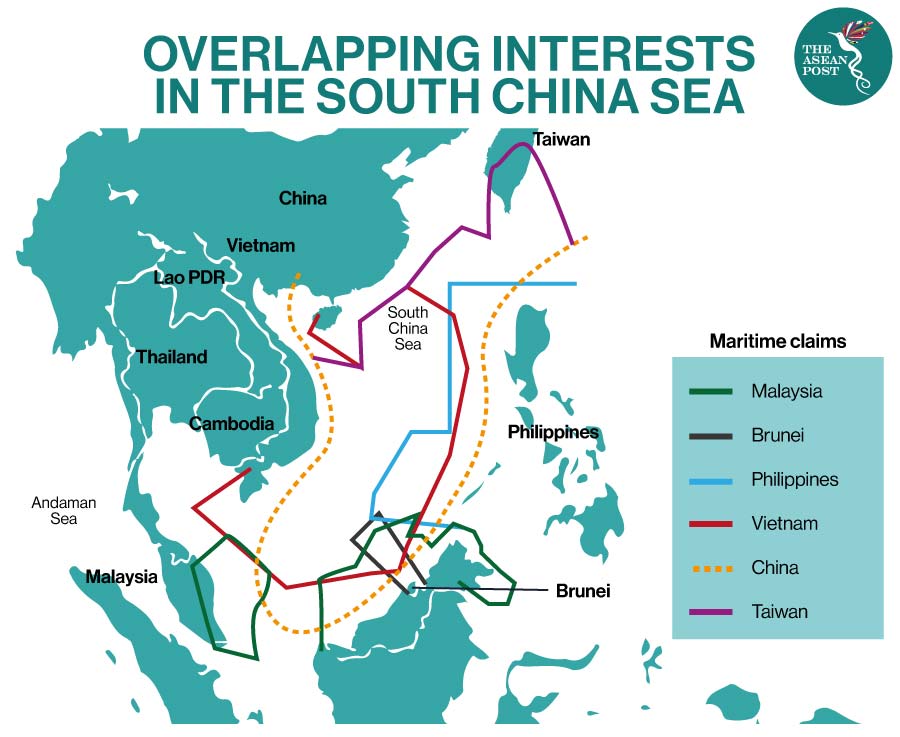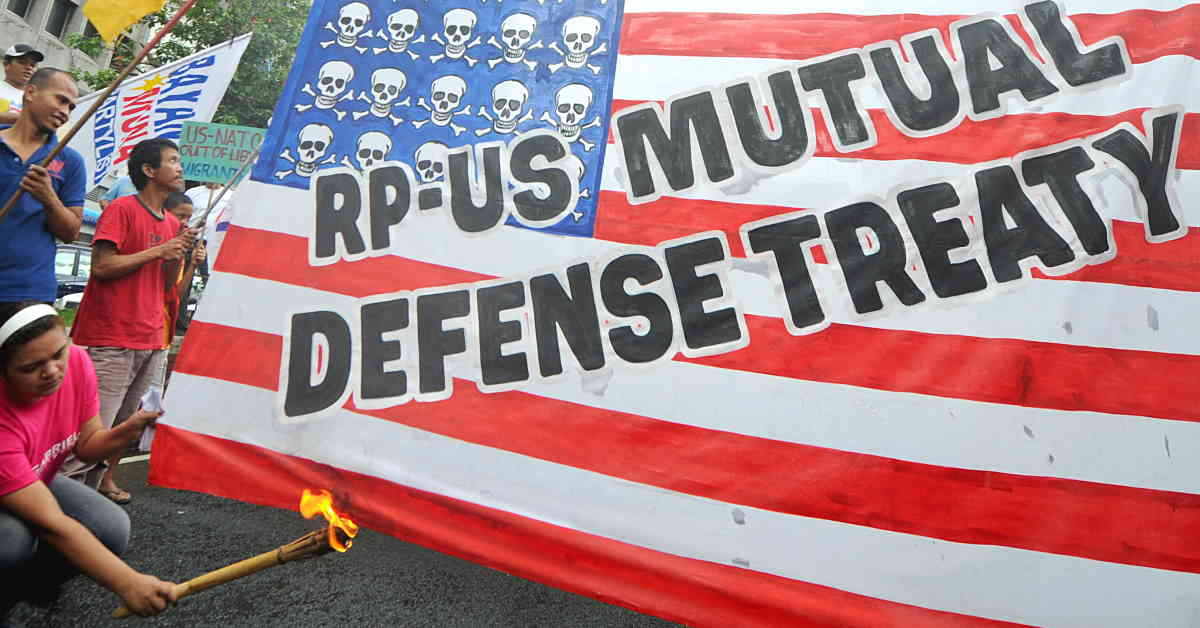On 20 February 2021, Philippines’ Foreign Affairs Secretary, Teodoro Locsin Jr. said that encounters or incidents that may arise involving Filipino vessels within the country’s exclusive economic zone (EEZ) would show the value of the 1951 Mutual Defense Treaty (MDT) with Washington DC.
The statement came after the United States (US) State Department spokesperson, Ned Price said that Washington is concerned with the enacted Chinese coast guard law, saying it "may escalate ongoing territorial and maritime disputes."
The MDT promises that the US and the Philippines will defend each other's territory in the case of external attack or aggression.
The concern raised by Locsin surrounding the MDT can be attributed to the fact that the MDT is in its rock bottom state at the moment. It is currently a subject of public debate; whether it should be scrapped or not. It has also been subjected to a review currently.
On 20 December, 2018, Defense Secretary, Delfin Lorenzana directed a review of the almost 70-year-old treaty between the Philippines and the US, to see if it is still relevant to the Philippines' "national interest.”
Lorenzana reiterated that the end goal of the review is either “to maintain it, strengthen it, or scrap it, and to know if indeed the MDT is still valid and relevant to this day.” Lorenzana implied that the review had been prompted by America’s ambivalence on whether the treaty applies to the disputed territory of the South China Sea (SCS) or not, and if America won’t clarify the treaty’s scope, then scrapping it altogether is “an option.”
Strategic Ambivalence
The US strategic ambivalence concerning the MDT can be traced back to what Hilary Clinton, US Secretary of State at the time, said concerning the “Scarborough Shoal Stand-Off” between the Philippines and China.
“The United States does not take a position on any territorial claim, because any nation with a claim has a right to assert it.”
But the irony behind Clinton’s statement rests on the pretext that she delivered it at the time when the Philippines was celebrating the 60th anniversary of the US-Philippine MDT in November 2011.
The “Scarborough Shoal standoff” refers to tensions between China and the Philippines which began on 8 April, 2012, over the Philippine Navy's attempted apprehension of eight mainland Chinese fishing vessels in the disputed Scarborough Shoal.
Security-Sovereignty Dilemma
Another peek at US strategic ambivalence concerning the MDT was the refusal of then-President Barack Obama to extend similar reaffirmation to what he promised to the Japanese surrounding the territorial dispute over Senkaku Island between Japan and China.
He told the Japanese that, indeed “the US will defend Japan in its island dispute with China as covered by Article V of the US-Japan Treaty,” which the text/language is identical to the US-Philippine security pact.
Obama did not extend a similar reiteration and reaffirmation for the Philippines to the disappointment and mortification of many Filipinos because of the explicit commitments he made to Japan but not to the Philippines.
The US’ “strategic ambivalence” over the disputed waters of the SCS is a huge disconnecting factor with regards to the Philippine-US security alliance.
This so-called “security-sovereignty dilemma,” which refers to the vague and informal assurance of the US that it would immediately extend assistance in case a foreign aggressor attacks the Philippines has been treated with deafening silence by the US since time immemorial. Several attempts to resolve this dilemma took place back in July 1953 and August 1965 but to no avail.
Until now the Philippine sovereignty and security issue, as defined in the MDT, remains vague. Thus far, this has been one of the most important considerations why the MDT has to be revisited or scrapped altogether if the US is unable to provide a straightforward clarification on this matter.
MDT Ambiguities
Even though the MDT was ratified by the US Senate, it is not enforceable in the US because it is not “by its terms” self-executory.
Based on the “Medellin doctrine,” the MDT is not enforceable in the US as federal law. What then is the implication of this on the part of the Philippines?
Another source of ambiguity is the absence of an “instant retaliatory clause.” The US Congress has to be consulted first and seek its approval before any retaliatory action can be taken.
All these ambiguities surrounding the MDT are confusing and begs the question as to when and in what circumstances the US will come to the aid and assist the Philippines within the sphere of the MDT, most particularly concerning the SCS?
China Threat Rhetoric?
However, to justify the need to continue with the MDT using the “China threat” rhetoric and the exaggerated paranoia over China’s newly enacted coast guard law bred by some Sinophobe political personalities in the country is quite misleading and deceptive. This is tantamount to veering away from the legitimate questions and issues surrounding the MDT since its inception.
The notion of an aggressive Chinese navy prowling the Western Pacific or the SCS, which according to them is threatening the sea-lanes and maritime territorial integrity of other claimant-states like the Philippines in the disputed waters of the SCS, connecting it to the newly enacted China Coast Guard Law, which is, by the way, a domestic policy of China, are again far-fetched and misplaced concerns that are at best, imaginary.
The Philippines’ Ambassador to China, Jose Santiago Sta. Romana said, "The Chinese have reassured us through their Foreign Ministry spokesman and the Chinese Embassy that they are not targeting the Philippines or any specific country and that they will not resort to force in the first instance."
Sta. Romana said the law's passage was originally expected sometime in March this year when the National People's Congress (NPC) opens its annual session. The measure was enacted last month at an NPC Standing Committee session. He even noted that the language in the law is "actually more moderate" than the initial version when the Embassy first reported China was considering it.
Though it is quite true that in some instances in the recent past, Chinese fishermen and vessels did harass fishermen and vessels of other countries as they were perceived to be encroaching on Chinese “maritime territory.”
Incidents like these are not new at all, and thus far, the Chinese are not the only ones guilty of such acts. Other parties to the dispute over the SCS have also committed such acts one way or the other. The Philippines too is not an exception here.

For instance, back in September 2017, two Vietnamese fishermen were found dead and five others were taken into custody after they were spotted fishing off the north-western Philippines, sparking a night chase where a Vietnamese boat hit a Philippine navy ship and prompted its crew to fire shots.
The incident took place in Bolinao town in Pangasinan province. As expected, Vietnam protested. The said incident happened within the 200-nautical-mile (370km) EEZ of the Philippines, a stretch of ocean where a coastal state has exclusive rights to fish and exploit other sea resources although foreign ships could pass through.
In 2013, a similar incident happened when a Philippine coast guard personnel opened fire and killed a Taiwanese fisherman on board a boat that sailed in waters between the northern Philippines and Taiwan, sparking protests in the latter country. Taiwan imposed sanctions on the Philippines before the row was diplomatically resolved.
The point of the matter is, these kinds of incidents happen at various times among various parties and they are quite common scenes for a long time since the SCS has been a contested area. Hence, these kinds of minor skirmishes and conflicts will likely happen from time to time. That’s a reality that all parties to the SCS dispute are confronted with including the Philippines.
However, the most important thing is, no serious military confrontations tantamount to war or a major conflict thus far has happened and this is the most important thing to take note of by all parties concerned. And this is where the importance of the Code of Conduct (COC) comes into play as a mechanism for peaceful resolution of the dispute.
Also, the deepening of diplomatic and bilateral relations between China and the rest of the claimant-countries including the Philippines at all levels and the pursuance of multilateralism within the ambit of the Association of Southeast Asian Nations (ASEAN) matter the most in bridging understanding and confidence between countries in the dispute to avoid both, minor and major conflicts in the contested waters of the SCS.
Hence, exaggerating the situation in the SCS and blowing China’s new coast guard law out of proportion is a deceitful way of justifying the need for the MDT to continue even though the said treaty is somewhat outdated and biased towards American strategic interests as opposed to the national security and interests of the Philippines.
Conclusion
The MDT is somewhat a “non-mutual” mutual defense treaty. This has been displayed by the US’ non-commitment.
The original rationale behind its crafting was to guard against a rearmed Japan after World War II, with the Soviet Union as the convenient secondary threat because of the Cold War.
But such threats are gone now. Thus, it begs to ask if there’s still a need for an MDT? It is also imperative for Filipinos to ask if the MDT should be scrapped or replaced by a new treaty or agreement based on the principles of equality and mutuality?
Hence, whatever decision the Duterte administration takes concerning the MDT, one thing is imperative, the Philippines needs a foreign policy that is based on its national interests and security and not that of the US or any other country for that matter.
This is Part 2 of a series of articles by the author.
Related Articles:

